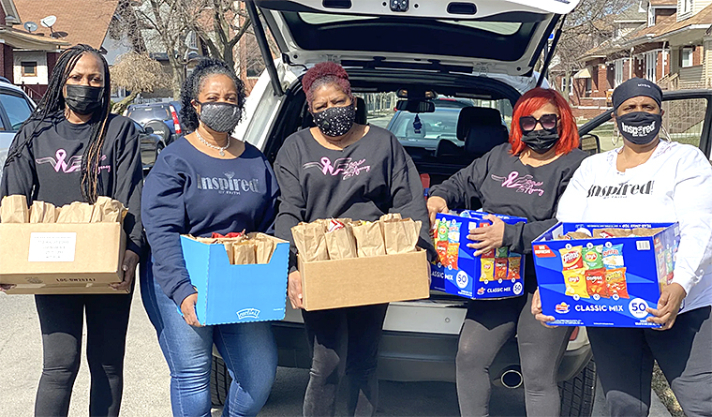
We Care 2 Agency volunteers prepare to deliver meals as part of their outreach, which includes education about breast cancer treatment and prevention and support for breast cancer survivors and their loved ones in metropolitan Chicago. Photo courtesy of wecare2agency.com.
As an entrepreneur and youth mentor, Kenya Johnson strengthened community bonds in Austin, one of Chicago, Illinois’s 77 community areas.
Her sister, Felicia Frazier, in turn strengthened her after Kenya was diagnosed with Stage 1 “triple-negative” breast cancer in December 2018.
When Kenya started chemotherapy, Felicia personalized a bag with toothpaste, tea, pain-relieving gel and more. “The bag says ‘cancer picked the wrong girl.’ It had glitter all over,” Kenya says. “Everything she had in that bag, I needed.”
From daily check-ins and home-made wigs to 3 a.m. trips to Kenya’s house when she experienced chemotherapy-related pain, Felicia was there. So were other people who cared about Kenya.
|
“When you learn to see your struggles as opportunities to become stronger; better; wiser, then your thinking shifts from ‘I can’t do this’ to ‘I must do this.’” — Kenya Johnson |
|
“Every time she went [for chemotherapy infusions], they’d get her a big room because there were so many people there; family and friends,” Felicia says.
Even with insurance, “you still have to pay some portion for the medication,” Kenya says. When she started radiation treatments, the cost became prohibitively high.
“All our family came together,” Felicia says. “We did a big party and fundraiser.”
With her own cancer treatment complete, Kenya is empowering people who are where she was.
She encourages people to get screenings, such as mammograms, early. Kenya says she learned of her cancer diagnosis after her first mammogram. “If you ever get diagnosed with cancer, it’s not the end for you,” Kenya says. “Early detection can save a life.”
She educates people on possible side effects, and the importance of quality nutrition during treatment. “You have other people here, like me,” Kenya says. “I’ll answer the phone.”
Kenya founded the We Care 2 Agency in 2019 to further her outreach, and has been recognized by hospitals in Chicago and its suburbs for her care package donations every two weeks.
“Strength comes from struggle,” Kenya says. “When you learn to see your struggles as opportunities to become stronger; better; wiser, then your thinking shifts from ‘I can’t do this’ to ‘I must do this.’”
As the We Care 2 Agency grows in supporters and funding, Kenya says she had a vision that will lessen the struggle for Austin and other Chicago neighbourhoods.
Austin is in a food desert. With lower household incomes, and having to travel more than a mile to access fresh food, residents find it harder to maintain daily health. During cancer treatments when nutrition takes on even greater importance, people living in food deserts have increased risk.
“We need to start with having more access to quality foods,” Kenya says. “That’s first and foremost.”
Felicia, who is studying culinary science, agrees with both the importance and the higher costs of some nutritious foods.
Two ideas include funding a voucher program for people to choose healthy foods during cancer treatment, and a food truck that would deliver freshly-prepared foods and meals to patients.
Kenya also envisions a physical location where people could recover from cancer treatments, and learn about options for financial support.
|
The referenced media source is missing and needs to be re-embedded.
|
|
“I have to start something for the people going through treatment so they don’t have to worry about the financial burden,” Kenya says. “You need to be focused on getting stronger.”
In Chicago, food deserts are more concentrated in majority-Black neighbourhoods, including Austin. Certain types of cancers — including “triple negative” breast cancers that do not have estrogen, progesterone or HER2 receptors — are also more common in Black women.
Kenya and Felicia say that nutritional support, health and technology literacy and social support can all make a difference in increasing equity in cancer care and outcomes.
“It’s about surviving together; not living alone,” Kenya says.





